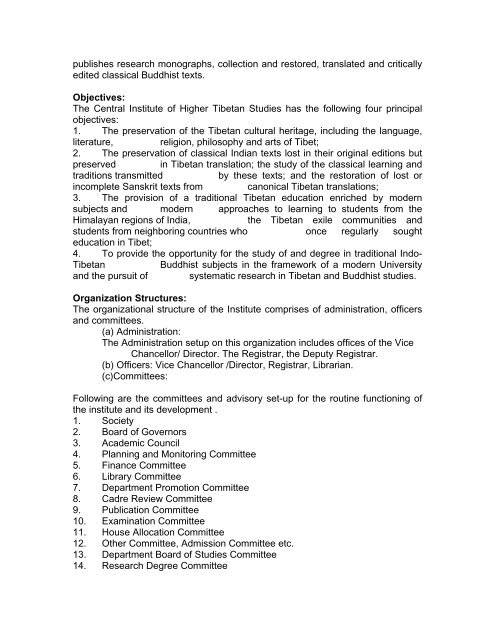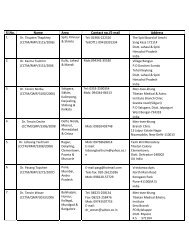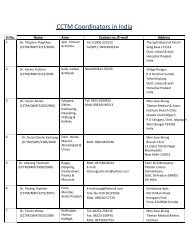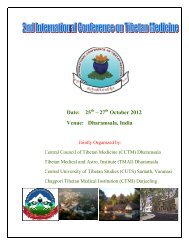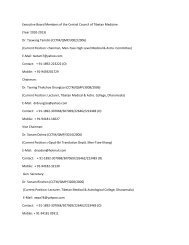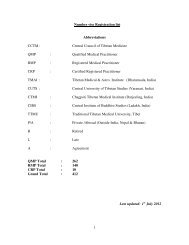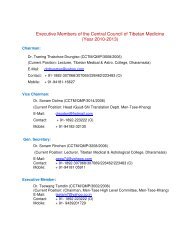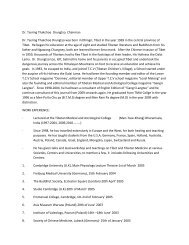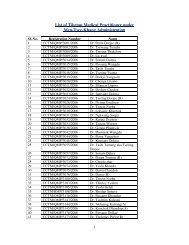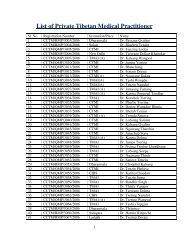1. The Central Council of Tibetan Medicine (CCTM) The Central ...
1. The Central Council of Tibetan Medicine (CCTM) The Central ...
1. The Central Council of Tibetan Medicine (CCTM) The Central ...
You also want an ePaper? Increase the reach of your titles
YUMPU automatically turns print PDFs into web optimized ePapers that Google loves.
publishes research monographs, collection and restored, translated and critically<br />
edited classical Buddhist texts.<br />
Objectives:<br />
<strong>The</strong> <strong>Central</strong> Institute <strong>of</strong> Higher <strong>Tibetan</strong> Studies has the following four principal<br />
objectives:<br />
<strong>1.</strong> <strong>The</strong> preservation <strong>of</strong> the <strong>Tibetan</strong> cultural heritage, including the language,<br />
literature, religion, philosophy and arts <strong>of</strong> Tibet;<br />
2. <strong>The</strong> preservation <strong>of</strong> classical Indian texts lost in their original editions but<br />
preserved in <strong>Tibetan</strong> translation; the study <strong>of</strong> the classical learning and<br />
traditions transmitted by these texts; and the restoration <strong>of</strong> lost or<br />
incomplete Sanskrit texts from canonical <strong>Tibetan</strong> translations;<br />
3. <strong>The</strong> provision <strong>of</strong> a traditional <strong>Tibetan</strong> education enriched by modern<br />
subjects and modern approaches to learning to students from the<br />
Himalayan regions <strong>of</strong> India, the <strong>Tibetan</strong> exile communities and<br />
students from neighboring countries who once regularly sought<br />
education in Tibet;<br />
4. To provide the opportunity for the study <strong>of</strong> and degree in traditional Indo-<br />
<strong>Tibetan</strong> Buddhist subjects in the framework <strong>of</strong> a modern University<br />
and the pursuit <strong>of</strong> systematic research in <strong>Tibetan</strong> and Buddhist studies.<br />
Organization Structures:<br />
<strong>The</strong> organizational structure <strong>of</strong> the Institute comprises <strong>of</strong> administration, <strong>of</strong>ficers<br />
and committees.<br />
(a) Administration:<br />
<strong>The</strong> Administration setup on this organization includes <strong>of</strong>fices <strong>of</strong> the Vice<br />
Chancellor/ Director. <strong>The</strong> Registrar, the Deputy Registrar.<br />
(b) Officers: Vice Chancellor /Director, Registrar, Librarian.<br />
(c)Committees:<br />
Following are the committees and advisory set-up for the routine functioning <strong>of</strong><br />
the institute and its development .<br />
<strong>1.</strong> Society<br />
2. Board <strong>of</strong> Governors<br />
3. Academic <strong>Council</strong><br />
4. Planning and Monitoring Committee<br />
5. Finance Committee<br />
6. Library Committee<br />
7. Department Promotion Committee<br />
8. Cadre Review Committee<br />
9. Publication Committee<br />
10. Examination Committee<br />
1<strong>1.</strong> House Allocation Committee<br />
12. Other Committee, Admission Committee etc.<br />
13. Department Board <strong>of</strong> Studies Committee<br />
14. Research Degree Committee


